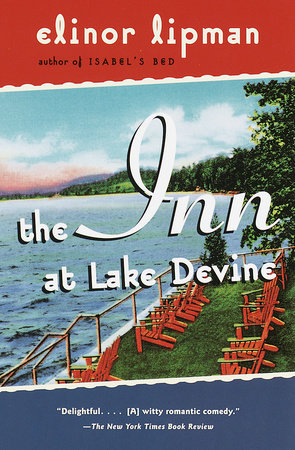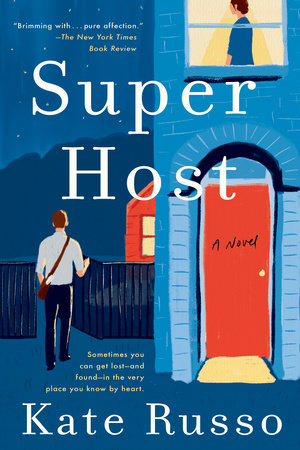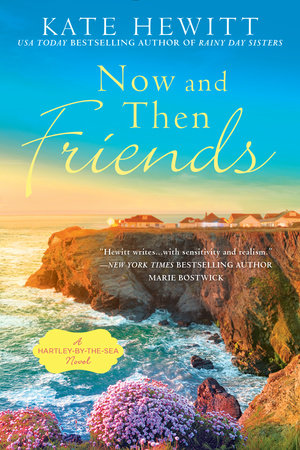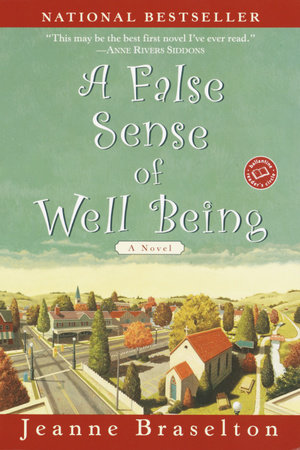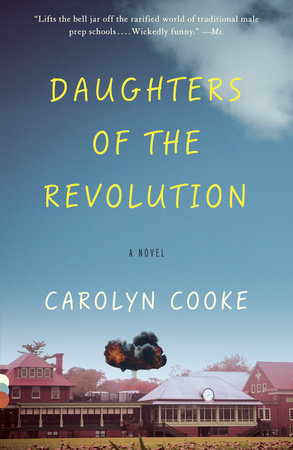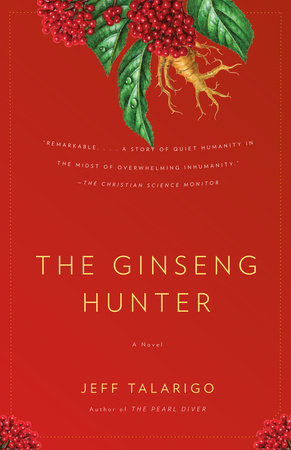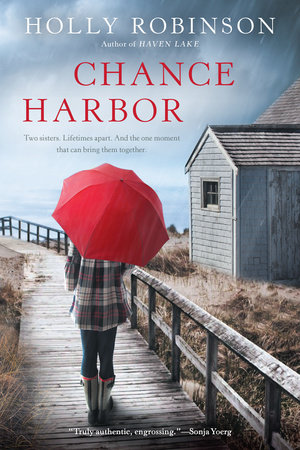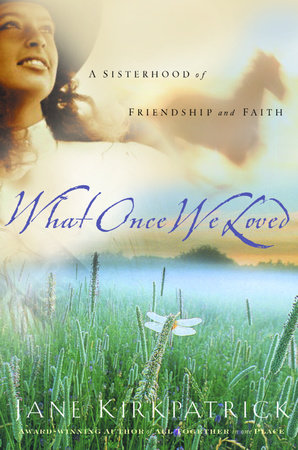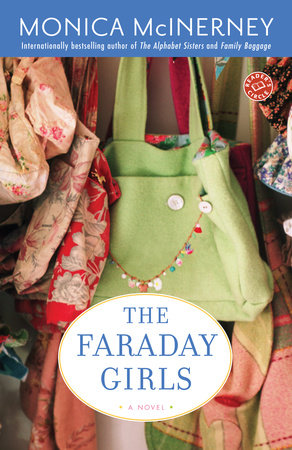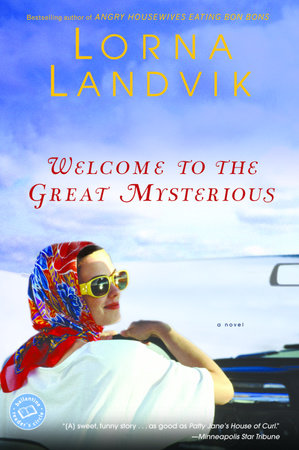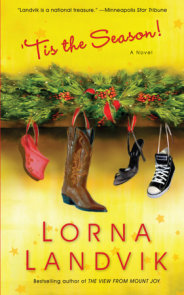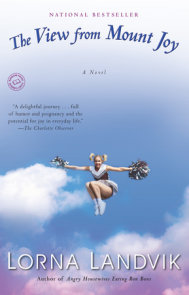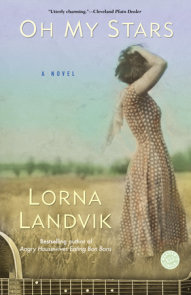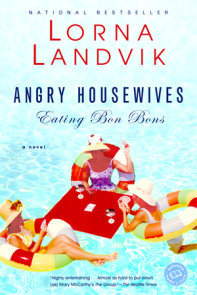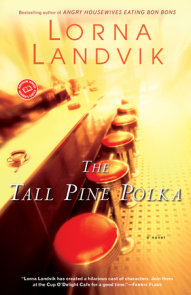Author Q&A
A Conversation with Lorna Landvik
Q: Why did you decide to tackle the subject of children with special needs and the challenges faced by them and their families in this novel?
A: The genesis of all my books has been the arrival of two characters who come into my head and intrigue me enough to want to start writing about them. I was scared by Rich’s Down syndrome, not knowing if I could accurately write about it, but he was adamant that I try. I hadn’t set out to write about children with special needs; the characters just demanded that I do so.
Q: Why is his daily routine important to Rich?
A: I think all children are comforted by routine, by something they can count on. Knowing what he’s going to eat on a Monday or a Tuesday helps Rich know that yes, this is Monday or Tuesday; this is how my world goes round. I think everyone, on some level, likes to think that their days have order.
Q: Why is Rich’s lack of inhibition so threatening to some people, including his aunt and many strangers?
A: Maybe that has to do with people’s desire for order, too; when someone acts differently than the norm, people are called upon to come up with a different response to them, and this makes them uncomfortable. Geneva obviously loves attention, but with Rich, she can’t control him or the attention that he attracts.
Q: Your readers are privy to Geneva’s deepest and darkest reservations regarding Rich. How difficult was it to write those interior monologues? Were you concerned about alienating readers?
A: I think the reader starts out thinking Geneva’s somewhat of a pill even before she goes back to Minnesota to take care of Rich. I thought if I don’t lose them early on, I probably won’t lose them when she vents her feelings about Rich, because at least she’s being honest with those feelings. It took her a while to get beyond the "obviousness" of Down syndrome to the point where she could see and love the real Rich, but at least she got there.
Q: Would you agree that the trip to the supermarket represents a major turning point for Geneva?
A: Yes, in that she recognizes herself in some of the behavior of others–and doesn’t like it. When Rich stands up for himself after his "disappearance," he shows Geneva that despite having Down syndrome, he is more like her than not.
Q: How would you summarize the evolution of Geneva’s understanding of Rich over the course of this novel?
A: She grows up and she gets a lot of help. She is helped by the voices in the "Great Mysterious" book, helped by her relationships with James, with Ann and Conrad, and most of all, with Rich. She has a concentrate of love from these people and that makes her able to finally return to Rich the kind of pure "I-love-you-because-you’re-you" love Rich so freely gives to people.
Q: Geneva begins this novel announcing that her twin sister Ann needs to work on her self-esteem. Does she still feel this way by the end of the story?
A: She’s probably wised up enough to realize that some people don’t need to wear the type of "Look at me!" sign she’s always worn; that self-esteem is really being happy with yourself whether or not anyone is looking.
Q: Geneva and James have both let their deepest fears rule their lives to some extent. In marrying, they are both confronting these fears head-on. Does this marriage stand a chance?
A: Romantic that I am, I always believe that where love is concerned, there’s always a chance. Geneva and James have also been around several blocks and are old enough to know that they’ll have to make compromises, but I think those compromises will be gladly made.
Q: We only hear about Connie’s father, George; he never gets to speak on his own behalf. Why did you decide on this strategy for that particular character?
A: By his own personality, George was a minor character. He had distanced himself from Conrad and the rest of the family, and I never gave him a chance to speak because he simply wasn’t around emotionally or physically.
Q: Geneva and James get a second chance to conquer their greatest fears. Will George get one?
A: I don’t know about George. He represents to me the worst in some (not all) men; the refusal to not only acknowledge their fears but to work actively to rid themselves of those fears. His refusal to open himself up to his family, as well as to his own vulnerability, dooms him to a half-life and I would hope, but can’t be sure, that he would recognize this and reach out.
Q: What inspired the book that gives your novel its title?
A: It’s just something the two sisters came up with. I put them at that cabin on a rainy weekend, and they, to my surprise, came up with recording their relatives’ thoughts on "big" subjects. I’m not much of a documentarian myself–my photographs tend to be stored in boxes and my children’s baby books are more full of good intentions than actual data. I’ve heard from a number of readers that they’ve started their own "Great Mysterious" books, and maybe I will too, if I can just get off my lazy #@(&*!
Q: Geneva and Ann are so disappointed because their grandmother’s responses in The Great Mysterious do not capture the wonderful, fun-loving woman they remember. What accounts for this disjunction between their memories and the paper trail she has left behind?
A: Some people can express themselves beautifully in life but become choked up and self-conscious in writing. She is one of those people.
Q: How would you respond to the Great Mysterious question: If you couldn’t be a person, what would you be?
A: Ey yi yi …maybe a bird–a conscious bird who knows that she’s flying and how cool that is.
Q: Has Geneva seen the last of Petunia?
A: She’ll probably paw at Geneva’s back door every now and then but whether or not she’ll be invited in is another story.
Q: Geneva works in a profession that is not kind to older women.The phenomenon of older men with much, much younger leading women is both common and troubling. What accounts for this double standard? Is there any solution?
A: I wish I knew what accounts for the double standard that’s rampant in society. I think some of it comes from men’s refusal to grow up–they still want to cling to their youthful, virile self and think that they are by dating women half (or a third) their age. As well as being enraged by this double standard, I feel sorry for men who need a physical manifestation of youth at their side to convince themselves that yes, they still mean something. I think it cripples all of us when we dismiss older women–Meryl Streep should be starring in just as many movies as Robert De Niro; that she isn’t makes it a smaller world for all of us. (As an actor myself, I’ve found the best way to avoid double standards–I write my own shows.) I’m hoping that nowadays boys are being taught to be feminists, because once they learn how to respect women, all human beings gain.
Q: What posed the biggest challenge in writing this novel?
A: I guess making sure Rich was authentic. But I felt lucky– he seemed to guide me more than I guided him.
Q: Were certain characters more difficult to capture? For example, were the children more difficult to write than adults?
A: No, I think it’s fairly easy for me to write as a child, because I feel my childhood is not in the far-off murky past, but just behind the corner. My characters do assume a life of their own in my head, and I always trust that they’ll find their way onto the page fully formed and real.
Q: How long did it take you to write this novel?
A: I submitted one version and my editor wanted me to expand on a lot more things so all together, a little over a year.
Q: What do you do when you finish a novel? Plunge into the next one?
A: Any time I’ve finished a book, there are always a couple of new characters who’ve sprouted up in my head, raring to go, wanting their stories told. So yes, I plunge right in and start writing.
Q: How do you know when you are finished with a piece of writing?
A: It just feels done. It’s like going on a trip; you’ve seen everything you want to see, eaten everything you’ve wanted to eat, met lots of friends, but now it’s time to go home.
Q: What do you find most satisfying about your cho-sen profession? What is least satisfying?
A: One of my daughters says she wants to be a writer– "because you get to sleep in." It is a perk, not having pantyhose or power suits or uniforms be a part of my wardrobe, but the biggest satisfaction is that I get to write. I am able to get lost in a world of my own making. I get to try and figure out what makes this person or that person tick; it helps me figure out the world (not that I have yet, but it helps me try). I really can’t think of anything not satisfying about writing.
Q: Beyond looking at sales figures or reading reviews, are there other ways you connect with your readership and gauge the reception to your work?
A: I love going on book tours and meeting readers from around the country.Their response to my writing has convinced me that just because a book is set in a certain place doesn’t make it "regional." (I was thrilled to hear a southern reader–quite adamantly–tell me, "You are not a Yankee writer!" ) Some readers take the time to write me–I cherish their letters. I also am invited to book clubs and get to sit in a comfortable chair eating all kinds of desserts and drinking wine while my books are being discussed!
Recently, I was at a book club meeting and the tragedy of September 11, 2001 was only a week and a half old. I was finding it very difficult to write (my writing seemed very small when compared to all that needed to be done in the world) and only kept the book club engagement because I thought I needed to get out of the house. We spent time talking about my books as well as this event that had shaken us all so violently. As the night was winding down, a woman said to me, "I just wanted to tell you that my sister called from Chicago and she’s been having a tough time. She said she’s started five books but couldn’t get into any of them and then she picked up The Tall Pine Polka (my third book) and now she’s halfway through and loving it. She says it’s helping her get through this."
Of course tears welled up in my eyes; I felt humbled and honored, and so grateful that I’d been able to help someone when I’d been feeling pretty helpless. I could never work in a triage unit, could never hoist a hose up the staircase of a burning building, could never track down a terrorist ring, but I could write.
Q: One last big question: If you could be the author of any book ever written (other than your own), what would it be?
A: If I’d been asked this question before September 11, 2001, I probably would have said something like, To Kill a Mockingbird (a perfect book) or the Bible (imagine sitting down and writing "Genesis" ). But now I wish I could be the author of a book that would be published in the not-so-distant future, a piece of nonfiction called, When Peace Came Over the World or How We Learned to Love One Another. I hope deeply, sincerely that someday someone is going to be able to write that book.



